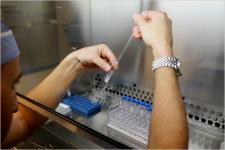Eggs and sperm can now be stored for up to 55 years – here’s what that means for donors and people seeking fertility treatment
By Caroline A. B. Redhead, Jackson Kirkman-Brown, Leah Gilman, Lucy Frith,
The Conversation
| 07. 04. 2022
The UK government has just extended the period that gametes (eggs and sperm) and embryos can be stored from ten years to 55 years. While this change will probably be welcomed by people who wish to have fertility treatment, it could have important implications for egg and sperm donors.
A growing number of people in the UK are choosing to freeze their eggs, sperm and embryos for use in their own fertility treatment. Previously, the storage limit was ten years – though extensions were permitted for people who could prove a medical need (such as premature infertility) up to 55 years.
But many felt that the storage limits restricted the choices of people who freeze eggs and sperm for their own fertility treatment. If they couldn’t give a medical reason to increase the storage period, these gametes had to be destroyed after ten years.
Cryopreservation techniques – which involve freezing gametes to preserve them – have also improved significantly since the previous storage limits were set. Studies now show that eggs frozen using current preservation techniques are likely to...
Related Articles
By Diaa Hadid and Shweta Desai, NPR | 01.29.2026
MUMBRA, India — The afternoon sun shines on the woman in a commuter-town café, highlighting her almond-shaped eyes and pale skin, a look often sought after by couples who need an egg to have a baby.
"I have good eggs,"...
By George Janes, BioNews | 01.12.2026
A heart attack patient has become the first person to be treated in a clinical trial of an experimental gene therapy, which aims to strengthen blood vessels after coronary bypass surgery.
Coronary artery bypass surgery is performed to treat...
By Staff, ScienceDaily | 01.05.2026
Scientists at UNSW Sydney have developed a new form of CRISPR technology that could make gene therapy safer while also resolving a decades-long debate about how genes are switched off. The research shows that small chemical markers attached to DNA
...
Following a long-standing CGS tradition, we present a selection of our favorite Biopolitical Times posts of the past year.
In 2025, we published up to four posts every month, written by 12 authors (staff, consultants and allies), some in collaboration and one simply credited to CGS.
These titles are presented in chronological order, except for three In Memoriam notices, which follow. Many more posts that are worth your time can be found in the archive. Scroll down and “VIEW...




